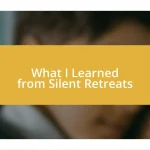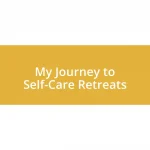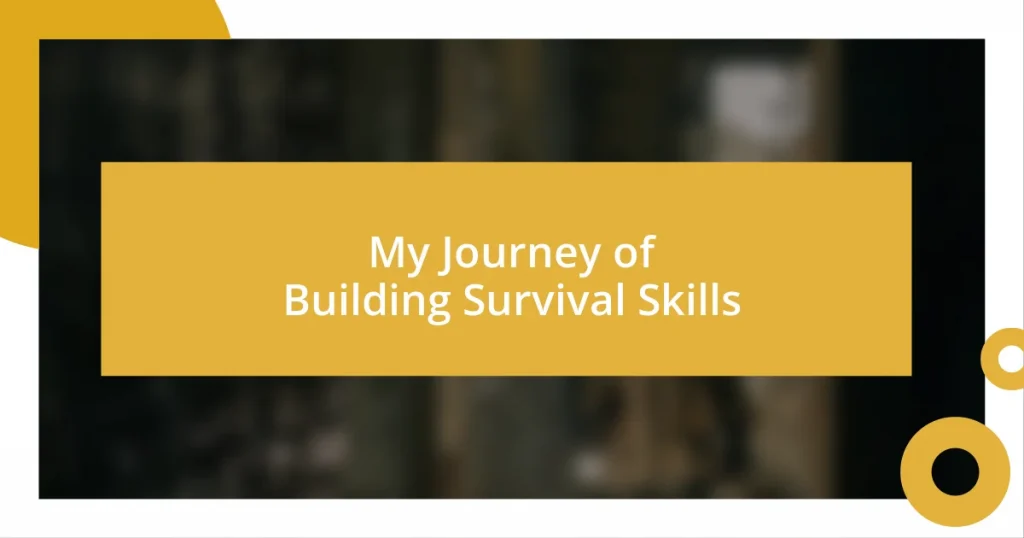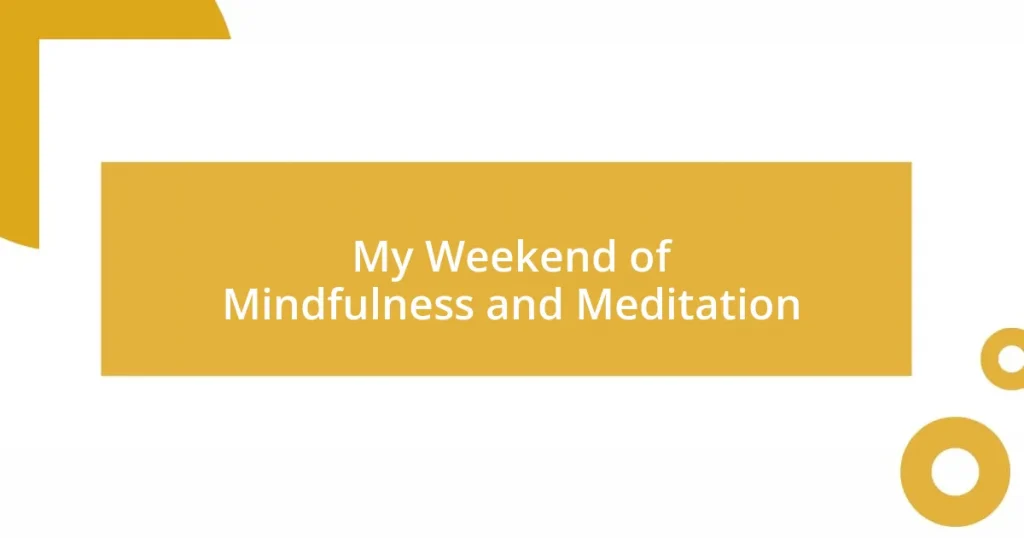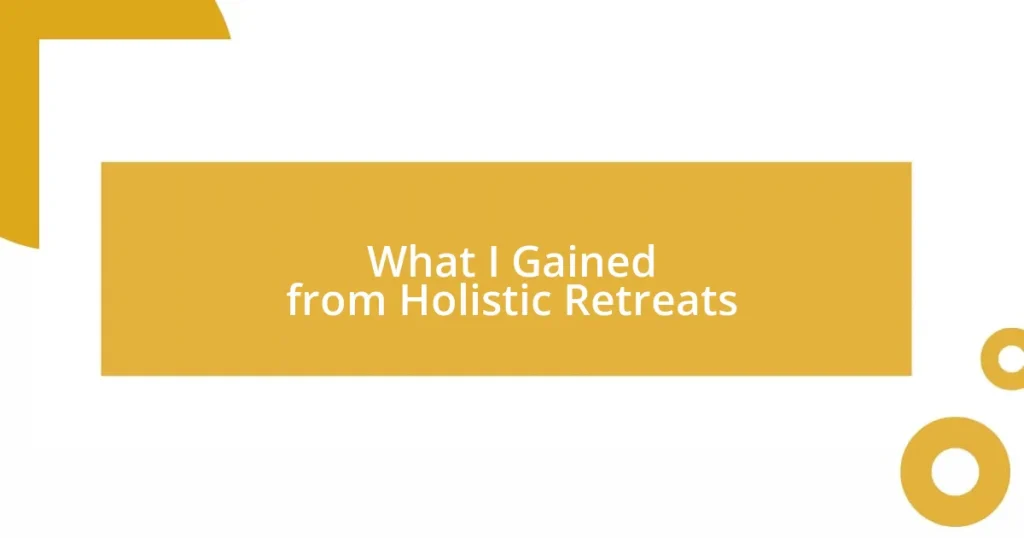Key takeaways:
- Mastering survival skills involves both physical techniques, such as fire-making and navigation, and psychological preparedness to handle challenges effectively.
- Building a supportive community enhances learning and accountability, allowing individuals to share knowledge and experiences in survival skills.
- Continuous learning and stepping outside comfort zones foster personal growth and uncover new interests in survival techniques, promoting an adaptable mindset.
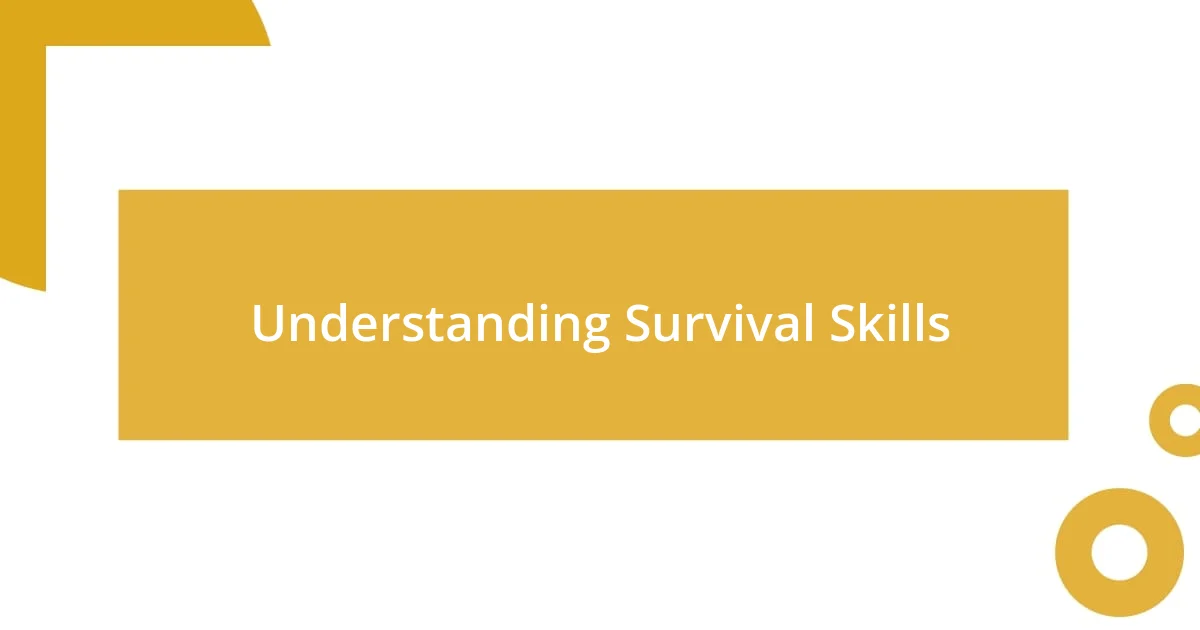
Understanding Survival Skills
Survival skills encompass a wide range of techniques that are crucial in ensuring safety and wellbeing in challenging situations. For instance, I remember the time I got lost while hiking. The panic that set in was overwhelming, but recalling basic navigation skills helped ground me. Have you ever found yourself in a similar situation, relying on instinct to guide you?
Understanding these skills isn’t just about physical survival; it’s also about mental resilience. I’ve found that maintaining a calm mindset during crises is as vital as knowing how to build a shelter or start a fire. Reflecting on those moments, I realize how emotional preparedness often makes the difference. What would you do if faced with an unexpected challenge?
There’s a certain empowerment that comes from mastering survival skills. When I first learned how to purify water, I felt an incredible sense of accomplishment. It was a simple act, but it opened my eyes to how resourceful I could be in dire circumstances. Have you ever felt a similar thrill from learning something new and realizing its importance in the grander scheme of things?

Assessing Your Environment
When assessing your environment, I’ve learned that the first step is to observe your surroundings carefully. The terrain, weather, and available resources can significantly impact your safety. I’ll never forget a camping trip when a sudden storm rolled in. Looking at the sky, I knew I had to find shelter quickly. Have you ever felt the urgency to react based on what you see around you?
Another essential aspect is understanding potential hazards in your environment. From sharp rocks to wild animals, each element can pose a risk. During one of my outdoor adventures, I stumbled upon a steep cliff that entirely shifted my approach to navigation. It was a stark reminder of how critical it is to recognize dangers ahead. What obstacles have you encountered that challenged your awareness of the surroundings?
Finally, I believe it’s crucial to identify the resources available for survival. Freshwater sources, food supplies, and materials for shelter are foundational elements I prioritize. I recall a hiking trip where I spotted berries along a trail. While some may have considered them a distraction, I saw a potential food source. This little discovery turned into a confidence booster for my skills. Have you ever found something in your environment that transformed your approach to survival?
| Environment Aspect | Key Considerations |
|---|---|
| Terrain | Identify elevation changes, water bodies, and escape routes. |
| Weather | Assess conditions like temperature and precipitation levels. |
| Hazards | Recognize risks including wildlife, rocky areas, or unstable structures. |
| Resources | Locate water sources, edible plants, and materials for shelter. |

Essential Tools for Survival
While it’s easy to overlook the importance of survival tools, I’ve come to understand that the right equipment can make all the difference. On a challenging trekking expedition, I relied heavily on my multi-tool, which proved invaluable when I needed to fix my gear in a pinch. Imagine being out in the wilderness with a broken strap or an unexpected cut; having the right tool at your side can turn a potentially dangerous situation into a manageable one.
Here are some essential tools that I always keep handy:
- Multi-tool: Combines various functions such as cutting, screwing, and opening bottles, making it a versatile companion.
- Water purification system: Whether it’s tablets or a filter, clean water is non-negotiable for survival.
- Fire starter: Matches, lighters, or fire sticks can spark warmth and safety when the temperature drops.
- First aid kit: Essential for treating injuries; a well-stocked kit can be life-saving.
- Navigation tools: A compass and map or GPS device can help avoid disorientation in unfamiliar terrains.
My first experience using a fire starter really stands out. After a long day of hiking, I was exhausted and needed warmth. The satisfaction of producing a flame from a simple tool felt empowering, almost like rekindling a deep, instinctual part of myself. Have you ever realized how tools can forge a connection to our primal survival instincts?

Basic and Advanced Techniques
Mastering basic survival techniques is like learning to walk before you run. For instance, I remember my first experience building a fire with nothing but dried leaves and twigs. It wasn’t just about creating warmth; it was about the thrill of nurturing a tiny spark into a roaring flame. How empowering is it to transform something seemingly insignificant into a source of life? I realized then that mastering the basics, like fire-making and shelter construction, lays the foundation for more advanced skills.
As I progressed in my journey, I discovered advanced techniques that often felt like unlocking hidden levels in a game. One memorable expedition had me foraging for food while employing tracking methods to observe wildlife patterns. This experience opened my eyes to the art of camouflage, blending into the environment to increase my chances of success. Have you ever attempted to observe animals quietly? It’s astonishing how much your surroundings reveal when you change your approach and truly listen to nature.
Implementing these advanced skills can often require a shift in mindset. I recall a moment during a solo trip, where I had to navigate using only natural markers. The challenge was daunting, but the navigation techniques I’d learned transformed the daunting task into an exhilarating adventure. It made me appreciate my capabilities and fostered a deeper connection with the wilderness. Have you embraced challenges in a way that transformed your perspective?

Psychological Preparedness for Challenges
Psychological preparedness is crucial when faced with challenges, especially in survival situations. I often reflect on my initial reactions during my first solo camping trip. I remember feeling that flutter of anxiety wash over me when I realized I was completely on my own in the dark woods. But instead of succumbing to fear, I consciously shifted my focus to the beauty around me—the rustle of leaves, the soothing sounds of nature. This awareness grounded me and transformed my anxiety into a sense of wonder.
Building mental resilience is just as important as honing physical skills. During a recent hike, I encountered an unexpected downpour that left me soaked and shivering. It was tempting to let frustration take over. Instead, I viewed it as a test of my adaptability. I took a moment to breathe, assessed my surroundings, and found shelter beneath a large tree. This experience reminded me how reframing negative situations can empower us—how can we turn challenges into opportunities for growth?
Moreover, visualizing success plays an integral role in my psychological preparation. Before embarking on any adventure, I take time to envision how I will handle different scenarios. One particularly challenging trek had me bracing for potential obstacles, like steep cliffs or wild encounters, all while imagining myself overcoming each hurdle. When faced with these situations, I felt more equipped and confident. Have you ever imagined a challenging scenario turning out positively? It’s a powerful tool that strengthens resolve and fosters a sense of control.
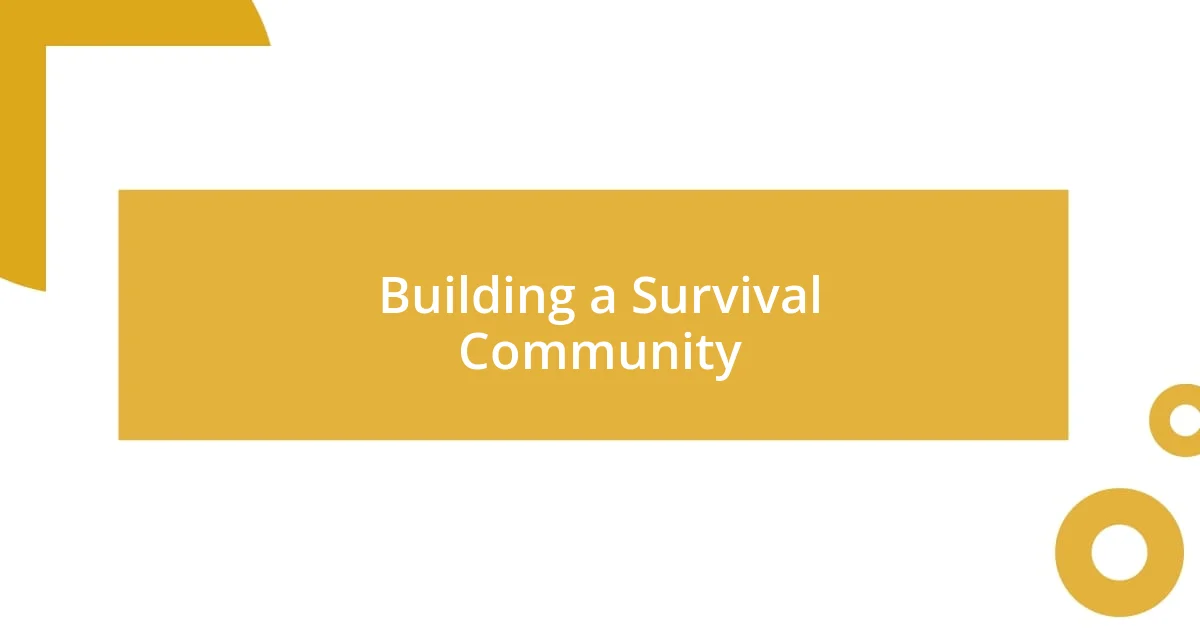
Building a Survival Community
One of the most rewarding aspects of my survival journey has been building a community of like-minded individuals. I recall a weekend when my friends and I gathered for a skills exchange; each person brought their unique expertise, whether it was wilderness cooking or knot tying. The excitement in the air was palpable as we traded knowledge and stories. Isn’t it amazing how sharing experiences can strengthen bonds and enhance our skills together?
Connecting with others also introduces a level of accountability that I found invaluable. During a group training session focused on emergency first aid, I felt a sense of responsibility for not just my well-being but for my peers as well. This collective learning environment fostered an atmosphere of support and growth. Have you ever felt that deep sense of belonging when working toward a shared goal? It can make all the difference in how we approach our learning and experiences.
Additionally, I cherish the variety that a community brings. Each encounter allows me to discover different perspectives on survival. I once met an individual who had a passion for foraging, and their enthusiasm inspired me to dive deeper into edible plants. We spent hours exploring the woods, with them eagerly pointing out what was safe to eat. How enriching is it to learn through others’ adventures? It reminds me that we don’t have to embark on these journeys alone; there’s an entire community out there waiting to teach and support us.
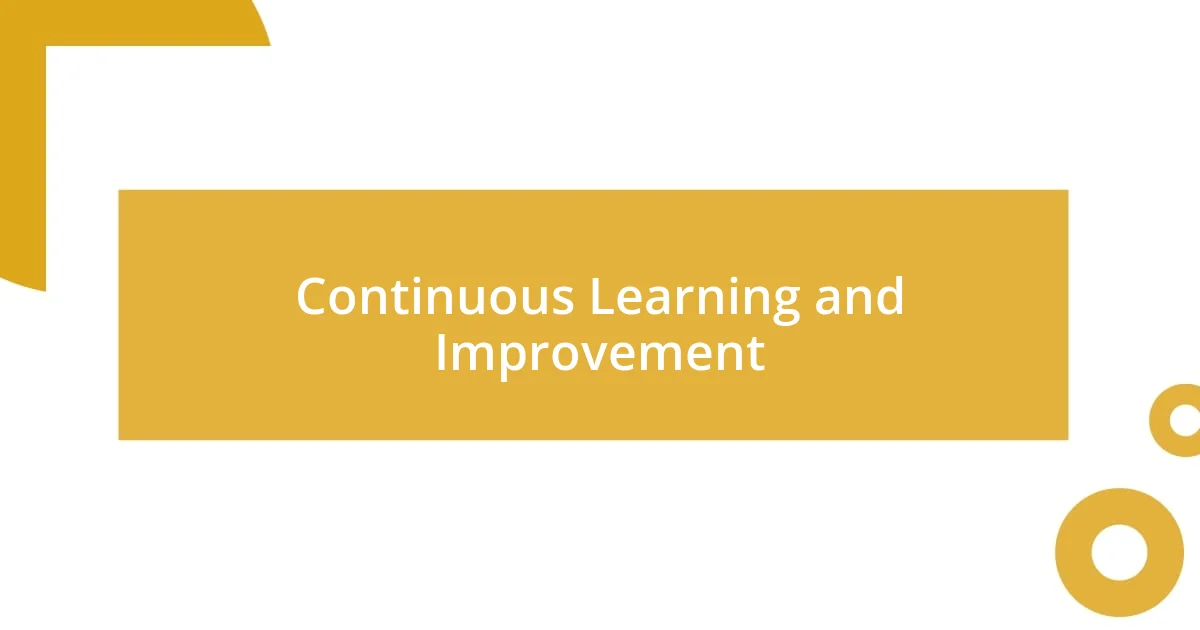
Continuous Learning and Improvement
Continuous learning isn’t just a concept; it’s a mindset I’ve embraced throughout my survival journey. I remember one afternoon at a local workshop on knot tying. Initially, I was frustrated as I struggled with the intricacies of each knot. Yet, by the end of the session, I found myself mastering several techniques, realizing that every misstep taught me something valuable. Isn’t it fascinating how our failures can actually pave the way for improvement?
I’ve also learned that improvement often comes from stepping outside our comfort zones. One time, I decided to join a wilderness navigation course, despite having minimal experience with maps and compasses. Admittedly, I felt intimidated during the first few classes. But each week, I honed my skills and grew more confident, proving to myself that discomfort can be a powerful catalyst for growth. Have you ever pushed through that initial unease to discover a new passion?
Moreover, I appreciate how continuous learning often reveals new interests I hadn’t considered before. During a survival skills retreat, I stumbled into a session on primitive fire-making techniques. Not only was it an exhilarating experience, but it ignited a fascination with ancient skills that I now incorporate into my practice. How often do we forget to explore the unexpected? It’s a reminder that learning doesn’t just happen in structured environments; it can unfold in delightful and surprising ways when we remain open to the possibilities around us.




